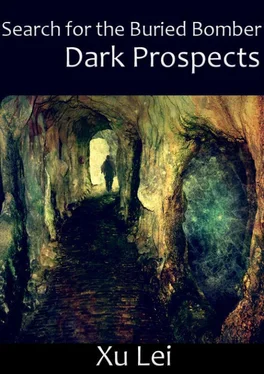By the time I caught up with them, the gunfire had already ceased. I saw that it was Pei Qing who had been doing the shooting. The soldier who’d accompanied him was nowhere to be seen. The deputy squad leader’s complexion had turned deathly pale. Along with another soldier he began running back toward camp. “What is it?” I asked, but he ignored my question and ran straight past me into the darkness. I could do nothing but climb over to Pei Qing and ask what was going on. His face was ashen and he made no reply. The soldier at his side began to explain, but he could barely get the words out. He just pointed and stuttered. It took some time before I understood what he was saying. Someone had fallen. The deputy squad leader had rushed back to find a rope.
I could hear the roar of water nearby. Taking a few steps closer, I saw that we had made it to the end. The boulder field had come to a sudden stop. Here the river crossed a fault line and dropped a level straight down, forming a waterfall. It wasn’t that high, sixtysome feet at most. As I shined my flashlight along its base, I could see that the bottom was entirely covered in rocks. Then my beam lit upon the soldier. His body was caught between two rocks, his whole face red with wounds and blood. I couldn’t tell whether he was alive or dead.
My head began to buzz. All at once the situation had become very serious. I hurriedly asked Pei Qing what had happened. He said that after reaching this spot they had initially planned to go back, but when he saw the waterfall was not that high, and given that they had already come this far—no easy feat, in itself—he decided to climb down and have a look. The young soldier told Pei Qing that he had been ordered by the deputy squad leader to protect him. This was a dangerous situation, the young man had said, so he’d better check it out first. Handing his rifle to Pei Qing, he began to climb down. Before the soldier had even gone two steps, he suddenly slipped and fell to the bottom. Pei Qing had immediately called for help, but after yelling for some time and receiving no response, he began to fire the rifle.
I’d seen this before. Losing one’s footing and falling is the most common danger we prospectors faced. I wasted no time in telling the two soldiers waiting next to me to call out the fallen soldier’s name. If he was still conscious, we had to keep him from going to sleep. They yelled and yelled—they called him something like “Big Beard”—but the fallen soldier didn’t make even the slightest response. My heart sank. The situation looked grim.
Wang Sichuan rushed in, once more exhausted to the point of collapse, but when he heard someone had tumbled over the side, he instantly went to climb down and save him. It took everything the two soldiers and I had to drag him back.
Finally, after twenty anxious minutes, they returned with the rope. The deputy squad leader himself descended, hoisted the young soldier on his back, and we pulled them both up. The deputy squad leader’s hands were covered in blood. At first I thought it had to be the fallen soldier’s, but then I saw the rips and gashes on his palms. Wire netting had been wound all the way up the falls. It was hidden behind the spray of water. This was why the young soldier had lost his footing. When I went to examine him, his eyes had already closed. He’d died a martyr’s death, and before I had even learned his name. Because he’d always worn a helmet, I’d never given this soldier a close look. Seeing him now, I could tell that he was no older than nineteen—still totally naive, recklessly tramping through his youth. He had died rashly, probably without ever having fallen in love, and no one had been there to hear his last words.
The deputy squad leader had served on the battlefield. His only response was to light a cigarette. The rest of the soldiers began to cry, as did Wang Sichuan. He grabbed Pei Qing, saying the boy was still a baby, how could you let him do something that dangerous. Pei Qing said nothing. He didn’t resist and his face looked terribly ashamed. I went to console the soldiers, but the deputy squad leader held me back. If they needed to cry for twenty minutes, I should just let them, he said.
The boy’s death hit me hard. We’ve always been conscious of the dangers inherent in prospecting work, and although we may appear relaxed, we’re nonetheless highly alert when it comes to these critical points. What a shame, I thought. We’d become so accustomed to taking care of ourselves that we’d forgotten to look out for others. We should have realized that these engineering corpsmen had no experience in geological exploration. Other than their level of physical fitness, they were no different from ordinary people. It was our negligence that killed this young soldier. These were the facts and there was no escaping them. Had it been I who brought the young soldier to this precipice, I wondered, would I have cautioned him before he climbed down? I’m afraid I too would have said nothing. Though all of us are highly skilled at our professions, when it comes to other things we’re entirely too lax. Pei Qing alone was not to blame.
That night we carried the soldier’s body back to camp and laid him on a sleeping bag. We couldn’t bring him deeper into the cave with us. Though we had to give him a proper burial, that would have to wait until we were on our way back to the surface. The deputy squad leader had us tuck in early, but how were we to calm down after something like that? None of us slept a wink.
The next day, not caring whether it was morning or night, we rose from our bags and put all of our belongings in order. After ceremonially paying our respects to the dead, we continued on our way. In 1962, our duty to the country was more important than anything else. Never once did we consider returning to the surface to rest, reorganize, and return again. We thought only of completing the mission. In prospecting jobs nowadays, as soon as something like this occurs, the assignment is over.
We stopped to eat lunch beside the waterfall. Here the body bags had already thinned out. The rocks had become smaller, the distance between them much closer, and our progress was now relatively easy. Wang Sichuan requested to scout ahead and explore the route, but we stopped him—for no other reason than it just didn’t feel right. After eating we took a twenty-minute rest. While fishing around in my pocket for a cigarette, I brushed against a crumpledup piece of paper. That hadn’t been in my pocket earlier, I thought. Unrolling it, I discovered it had been torn from a labor-insurance form. There were only four words: “Beware of Pei Qing!”

CHAPTER 11

The Note
Ihad no idea who had covertly stuffed the note into my pocket. I glanced around at the rest of the group, but no one was paying me any attention. Then I looked over at Pei Qing. He was cleaning the martyred soldier’s old rifle. After the soldier died, Pei Qing had begun carrying the gun on his back. Though it had made no difference to me before, I suddenly found something distasteful about the sight.
Things were getting rather frustrating. Back then the country was in a bad way. We’d just suffered three years of natural disasters and were now facing the threat of invasion by the Kuomintang. I assumed the latter was to blame for the strictly enforced confidentiality of our mission. The threats were coming from both sides, however. In those years, “Kuomintang spy” had become a sensitive term on the mainland. Today this must sound like the plot of some second-rate TV drama, but at the time it was no laughing matter. Supposed US-backed spies for Chiang Kai-shek were “found out” within the police force, people’s militia, and people’s communes. Men and women were being seized at the slightest provocation. Wang Sichuan later put it best: You could look at it two ways, he said. On the positive side, the nation deeply impressed upon the minds of its citizens the importance of national security. Of course, the other way to see it, he continued, was a form of entertainment. In 1962 the country was engaged in class warfare, and as dances and parties disappeared entirely, all that was left to while away one’s days was the possibility of catching a few spies.
Читать дальше














